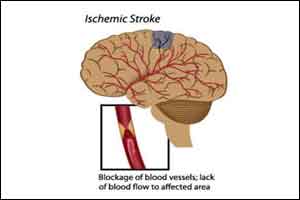- Home
- Editorial
- News
- Practice Guidelines
- Anesthesiology Guidelines
- Cancer Guidelines
- Cardiac Sciences Guidelines
- Critical Care Guidelines
- Dentistry Guidelines
- Dermatology Guidelines
- Diabetes and Endo Guidelines
- Diagnostics Guidelines
- ENT Guidelines
- Featured Practice Guidelines
- Gastroenterology Guidelines
- Geriatrics Guidelines
- Medicine Guidelines
- Nephrology Guidelines
- Neurosciences Guidelines
- Obs and Gynae Guidelines
- Ophthalmology Guidelines
- Orthopaedics Guidelines
- Paediatrics Guidelines
- Psychiatry Guidelines
- Pulmonology Guidelines
- Radiology Guidelines
- Surgery Guidelines
- Urology Guidelines
Migraine patients more vulnerable to stroke

A migraine is likely to increase individual vulnerability to ischemic stroke during the process of acute brain ischemia, concluded a study published in the journal Stroke. The said study was conducted by Alessandro Pezzini, researcher at Dipartimento di Scienze Cliniche e Sperimentali, Clinica Neurologica, Università degli Studi di Brescia, Bresica, Italy, and colleagues, to determine whether a personal history of migraine is associated with vulnerability to brain ischemia in humans.They found that migraine is likely to increase individual vulnerability to ischemic stroke.The study has been published in journal STROKE.
A large body of literature supports a link between migraine, especially migraine aura, and ischemic stroke. But, the mechanisms underlying the relationship between the two disorders remain to be elucidated. Cerebral hyperexcitability in migraine experiencers might sensitize brain tissue to ischemia. This finding directly support the hypothesis that brain tissue in migraineurs is more susceptible to ischemic injury.
The study involved multicenter cohort study of patients with acute ischemic stroke who underwent a brain computed tomography perfusion and were scheduled to undergo reperfusion therapy. In a case–control design, the researchers compared the proportion of subjects with no-mismatch, the volume of penumbra salvaged, as well as the final infarct size in a group of patients with migraine and a group of patients with no history of a migraine. It included 61 patients with migraine (34 [55.7%] men; mean age, 52.2±15.1 years; a migraine without aura/migraine with aura, 44/17) and 61 patients with no history of migraine.
Based on the study, the researchers found that the proportion of no-mismatch among migraineurs was significantly higher than among nonmigraineurs (17 [27.9%] versus 7 [11.5%]; P=0.039) and was more prominent among patients with migraine with aura (6 [35.3%]; P=0.030) while it was nonsignificantly increased in patients with a migraine without aura (11 [25.0%]; P=0.114). Migraine, especially migraine with aura, was independently associated with a no-mismatch pattern (odds ratio, 2.65; 95% CI, 0.95–7.41 for a migraine; odds ratio, 5.54; 95% CI, 1.28–23.99 for a migraine with aura), and there was a linear decrease of the proportion of patients with migraine with aura with increasing quartiles of mismatch volumes. Patients with a migraine with aura had also smaller volumes of salvaged penumbra (9.8±41.2 mL) compared with patients with a migraine without aura (36.4±54.1 mL) and patients with no migraine (45.1±55.0 mL; P=0.056). Conversely, there was no difference in final infarct size among the 3 migraine subgroups (P=0.312).
The authors concluded that a migraine is likely to increase individual vulnerability to ischemic stroke during the process of acute brain ischemia and might represent, therefore, a potential new therapeutic target against occurrence and progression of the ischemic damage.
For further reference click on the link: https://doi.org/10.1161/STROKEAHA.118.020554

Disclaimer: This site is primarily intended for healthcare professionals. Any content/information on this website does not replace the advice of medical and/or health professionals and should not be construed as medical/diagnostic advice/endorsement or prescription. Use of this site is subject to our terms of use, privacy policy, advertisement policy. © 2020 Minerva Medical Treatment Pvt Ltd